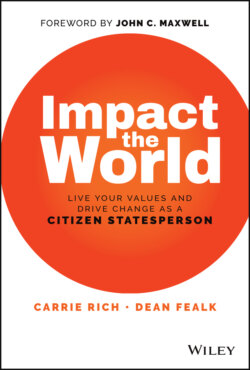Читать книгу Impact the World - Carrie Rich - Страница 11
Becoming a Citizen Statesperson
ОглавлениеWhat do you need to become a citizen statesperson?
Let's start with what you don't need. You don't need extraordinary wealth or resources. You don't need important social or political connections. You don't need an army of enthusiastic supporters dedicated to achieving your success.
What you do need is a commitment to create positive change, and the will to see it through.
Consider Reyhan Jamalova's story. In her small village of Baku, Azerbaijan, the schools didn't teach science, technology, engineering, and math. Girls were largely expected to be married by age 17 and to devote their lives to their families. But Reyhan was drawn to science—and when she received the highest score on the entrance exam to a competitive school in Buka at 12 years old, she left her family to study and pursue a better education.
Reyhan quickly discovered that she was interested not only in learning, but in action. In Azerbaijan, strong rains frequently cause temporary electrical outages. Reyhan wondered whether one challenge could be used to solve the other, and whether rainwater could be used to generate energy. For four months, she and a friend, assisted by mentors, ran calculations and developed a device capable of doing exactly that. With financial support from the Azerbaijani government, Reyhan built her first prototype.
Her goal was to present her product at the 2017 ClimateLaunchpad, the world's biggest green business competition. But in an accident, the generator shut down four days before the national final. In desperation, the team turned to two of the country's leading engineers, who told them that rebuilding the prototype in the time remaining was impossible. Undeterred, Reyhan and her team worked nonstop to re‐create their model—and won the “Audience Favorite Startup” award in the ClimateLaunchpad competition.
She was just 15 years old.
Since then, Reyhan secured new investors and considered broadening her work to additional countries like the Philippines, India, Malaysia, and Indonesia, where monsoons are frequent, taking her idea and her entrepreneurial drive to new heights.
Reyhan didn't start her journey with immense stores of resources or broad support networks. Rather, she tapped into her driving passion to make an impact, and determined to push through challenges to reach her goals.
We know that individuals play critical roles in starting movements, for good or for ill. We've seen these movements play out in the last few decades. A merchant sets himself on fire and ignites the Arab Spring. A schoolgirl from Pakistan survives an assassin's bullet and fights for the right for women in her society to access education. A young Swedish activist challenges world leaders to address climate change, spurring global protests by millions of young people demanding a better future.
Of course, not every individual‐led movement succeeds or crystalizes into positive impact. That's why there's more to being a citizen statesperson than being the symbol of a campaign or a liaison to global powers. To be a citizen statesperson, you must shape the dialogue and outcome according to your values. You must build social currency over time through social change efforts. And you must strive to play a meaningful and constructive role in helping to solve big problems in areas where traditional institutions have fallen short.
At their best, a political statesperson and a citizen statesperson do the same things; they bring people together, they forge solutions through diplomacy, and they push for agendas and social changes that benefit society. The difference is that a political statesperson is someone who represents his or her country or community in an appointed role, while a citizen statesperson is self‐appointed—spurred by civic responsibility to take on larger challenges and harness a force for good in the world.
That's why the values we're discussing are so critical. Without drive, a person can't find the motivation to get involved in civic work. Without practicality, one can't navigate existing obstacles. Without perspective, one can't envision the impact that is possible through their own applied effort. The values that describe citizen statespeople—from realism to focus to leadership to scale—don't just help citizen statespeople achieve their goals; they also get regular people to the starting gate, helping others achieve their potential and become citizen statespeople themselves.
